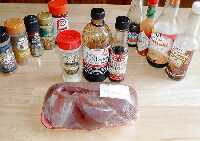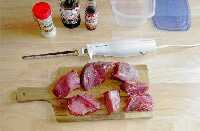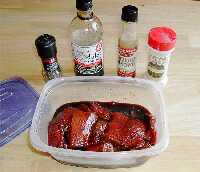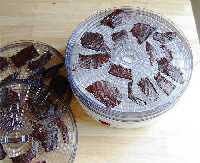|
When I first began making venison jerky, I was surprised at how easy the process was. Also surprising is how fast my bag of jerky disappeared when offered to friends. Now, many batches of jerky later, the most frequent question I am asked at work and church each deer season is, "Have you got a deer yet?" Invariably the next question is, "When are you going to bring in some more jerky?"
There is good reason venison jerky is popular. This isn't the chopped, pressed, preservative laden 'jerky' stuff you will find in the aisles of convenience stores and super markets priced at a couple of dollars an ounce. Rather, homemade jerky is a real meat snack marinated to your own liking with spices you choose. The pennies versus dollars per ounce price of making my own jerky is a pleasantly frugal bonus, but it doesn't compare to the admittedly primal satisfaction of hunting, harvesting and consuming my own prey.
The jerky making process is simple, but a few precautions along the way will make the final product safe and delicious. Venison is the ideal choice because of the lean nature of the meat. Rump (a.k.a. ham) roasts are easiest to prepare. Begin by freezing the meat for at least a month. The freezing will kill most organisms that could possibly be in the meat. This step is really erring on the side of caution, but I like the peace of mind. The major function freezing really serves is to ease preparation. To begin, let the meat half thaw. Divide the roast into the natural muscle divisions and trim off all fat and white connective tissue. Fat will not dry, and if left on the jerky will turn rancid. Connective tissue and 'silver skin' covering the meat and present between muscle divisions will make jerky tough and stringy. Spend sufficient time to trim the meat, and the final product will have the high quality you are after.
An electric knife like commonly used for carving turkey eases the slicing of the half frozen meat. Aim for slices of even thickness between one eighth and one quarter of an inch. Some people have preferences for the jerky to be either sliced with or across the grain. Slicing across the grain makes the jerky easier to break and chew. I have no real preference and would rather concentrate on making the slices as even as possible. If not sliced evenly, the individual jerky pieces will be dry and brittle on the thin end and not yet done on the thick end.
I don't use marinade recipes. Instead, I prefer to mix my own according to my whim of the moment. I commonly use Dale's Steak Seasoning, Liquid Smoke, garlic powder and fresh ground black pepper. Cut the Dale's sauce by fifty percent with water unless you desire an extremely salty jerky. Other good marinade ingredients are worcestershire sauce, teriyaki sauce, soy sauce and hot sauce. Red pepper flakes, Cajun seasoning and Emeril's Essence are also good choices. Use the flavors that you like in the proportions you prefer. Be creative and develop your own flavor. If you just have to have a written recipe to follow, Mary Bell's book Just Jerky - The Complete Guide to Making It has dozens of recipes as does www.recipesource.com.
A nonreactive plastic bowl with a lid works best for marinating. Just add the meat strips to the marinade, cover and shake. Put the marinade into the refrigerator and allow the meat to soak overnight and thoroughly thaw.
Inexpensive food dehydrators work well, but so does your regular oven at a low heat setting. If using your oven, toothpicks for hanging the jerky strips, an aluminum foil sheet for catching any drips and propping the door slightly open to increase airflow are valuable tips. Regardless of what you use to dry your jerky, to be safe, jerky must reach at least 145 degrees to kill most bacteria.
Anywhere from four to twenty four hours later the jerky will be done. I prefer to dry mine until almost brittle when bent. Others prefer not quite so dry. It is somewhat a matter of preference, but keep in mind that dryer jerky will last longer. Airtight storage and refrigeration or freezing also extend the shelf life of jerky.
I make my pastor his personal bag of jerky each season. He won't share it with anyone, but that isn't so bad as you can now make your own jerky.
Copyright 2004 by Andy Eddings
|



